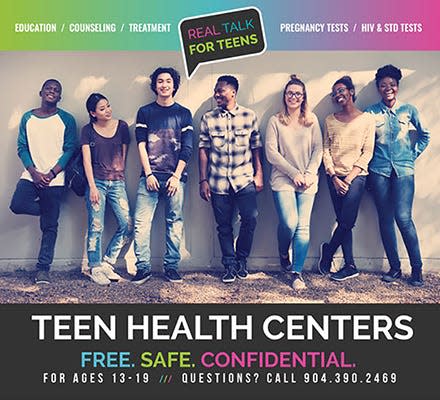Could CDC youth survey's end also cancel Duval schools teen health centers?

The $500,000 federal grant that funded Duval County Public Schools' controversial 2023 youth survey also funds other health services for youth, including 15 mostly school-based Teen Health Centers across Jacksonville.
Whether the school district's recent cancelation of the survey will impact the other programs' funding before the grant expires this summer — or the district's ability to get more federal funding afterward — remains to be seen.
"It is in jeopardy," said Elissa Barr, a professor of public health at the University of North Florida who is a research coordinator for the U.S. Centers for Disease Control grant. "We have the money to support the clinics only through this July 31."
But district officials were not in a panic about current or future funding.
"At this stage, there has been no indication from the grantor [CDC] that any of the services or activities of the grant are in jeopardy for this cycle," school district spokesman Tracy Pierce said. "Like any grant, funding is only available for the time period of the grant and there is never a guarantee that grant-funded programs will continue beyond that designated time period."
Duval Schools cancel 2023 youth survey:Decision followed 'grave concerns' from state education commissioner
How students responded:What does the 2021 Youth Behavior Survey reveal in Jacksonville?
Barr said the district can request a one-year extension of the grant, as well as apply for funds to continue through another five-year grant. But Superintendent Diana Greene has not decided whether to do so.
"It is premature to speculate about the future of these programs," Pierce said. "Over the next few months we will have conversations with our partners and the grantor to determine what will happen following the conclusion of this grant cycle."
CDC and state and Duval Health Department representatives did not respond to requests for comment.
What would be the impact on youth services?
Barr said the impact of losing the teen centers in particular, which provide free and confidential family planning services, pregnancy tests, sexually transmitted disease testing and condoms, among other things, "would be huge."
"These clinics … serve the people who need it the most — the teens, and many underserved teens," she said. "The services are brought to them, so they don’t have to find a ride, take the bus, etc. to the Health Department. They are also free so cost isn’t an issue. We’ve removed the 'barriers to care' and improved their 'access to care.'"
Also, the centers are "teen-focused," staffed by nurses and health educators who take the time to talk to the teens. Without them, Barr said, teens would receive less education and resources and testing.
The loss of the teen centers would also mean youth would have less access to testing for sexually transmitted diseases. From August 2022 through January 2023 alone, the centers have already served about 1,000 Duval students: 156 teens tested positive for a sexually transmitted disease and three tested positive for HIV.
"People would not know they are infected. They would not get the treatment they need and could continue to pass them to others," Barr said. "We would have a higher infection rate among our young people. They also wouldn’t receive support services, like counseling, that is such a critical piece in this work."
The grant goes to the school district and then to the county Health Department, which oversees the survey and the clinics.
Since 2013, the district has received youth health grants from the CDC's Division of Adolescent School Health. The district and the Health Department developed the teen centers "to focus on three key areas addressing high-risk behaviors: Sexual Health Services, Sexual Health Education and Safe & Supportive Environments," according to the district website.
The programs' health educators instruct youth about the risks of HIV and other sexually transmitted diseases and provide "critical sexual health services in locations where these services are not readily accessible," according to the website. The district and Health Department "collaborate with schools, families and community organizations to create safe and supportive environments for all emerging adults."
bcravey@jacksonville.com, (904) 359-4109
This article originally appeared on Florida Times-Union: CDC youth survey canceled: Could Jacksonville teen centers follow?
